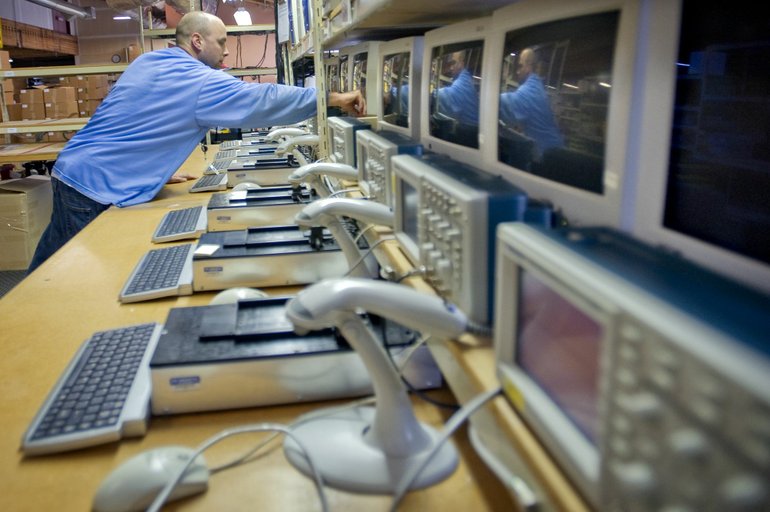RS Medical plans to double in size to more than 1,000 employees within two to three years, chief executive officer John Konsin said this week. About 200 of those new jobs are likely to land at the firm’s Vancouver headquarters, where half of its 600 employees work, he said.
This growth could place RS Medical, also known as International Rehabilitative Sciences Inc., at the forefront of an effort to build the metro area region into the fourth U.S. hot spot for medical device manufacturers, after Boston, Minneapolis and San Francisco.
“It would bring so many jobs and so much stability to the Portland metro area,” Konsin said.
The 20-year-old business, which makes electrotherapy devices and braces for pain management and rehabilitation, has undergone major changes since the beginning of the year, when longtime CEO and co-owner Rick Terrell stepped down to oversee the research division, Meagan Medical. Terrell hand-picked Konsin, previously a vice president with Covidien of Waltham, Mass., as his replacement to shepherd RS Medical toward rapid growth. Konsin has since completely reorganized the company.
It has been transformed from a family-owned culture with somewhat haphazard bottom-up growth to a corporate top-down culture that’s strategy- and profit-driven, said Dean Mannello, a Vancouver-based technical recruiter who consulted briefly with RS Medical.
The changes already are yielding results. The company this week announced its first federal supply contract to provide its pain management devices to veterans and others with federal health benefits.
Company officials declined to discuss financial information.
“John Konsin is the right CEO at the right time for RS Medical,” Mannello said. “Because he came out of a billion-dollar-plus company as a general manager of a very large division, he understands policy, procedures, performance and aligning human capital with the needs of the organization. He sees what needs to be done there.”
Konsin’s first-year shake-up culminated this month when he hired eight vice presidents to lead each of the firm’s major departments. RS Medical was previously managed by just two or three people, Konsin said. The new structure, accomplished without any layoffs, distributes responsibility and limits the number of employees that report directly to each manager.
Konsin sought outsiders to broaden the experience of RS Medical leaders. The new team will spend the rest of 2010 identifying market and product opportunities. He then plans to spend the next few years following through on that analysis and delivering quarters of double-digit growth.
He also aims to become a premiere employer in Clark County, he said. Local jobs are in research and manufacturing. Other sites employ sales and distribution teams.
As RS Medical grows, it aims to cement strategic partnerships and possibly acquire other companies, which Konsin acknowledges also might require outside sources of funding.
The company has no plans to sell or go public and isn’t seeking venture capital, he said, but funding through individual investors who are not seeking a quick exit is an option. He said he believes that a vibrant industry cluster would attract investors, not only for his own company but for startups here, as well. But a strong local cluster, important to RS Medical’s goals, could be years off.
Only a few medical device manufacturers exist in Clark County and the surrounding area, said Bart Phillips, CEO of the Columbia River Economic Development Council. RS Medical might be the largest.
Such a small group limits the talent pool in the immediate area, making it harder for companies such as RS Medical to find skilled workers, said Chuck Nokes, president of REDpoint International Inc., a medical device startup in Vancouver. Neither is the industry here large enough to attract venture capital or private equity investors to fund the expensive research and development process that leads to innovative products.
“Right now in Clark County, it’s a bit stagnant,” Nokes said. “It’s very difficult to raise the necessary capital. The funding sources locally do not have a lot of experience in the medical device field, and that’s been the downfall.”
CREDC is developing its own strategic plan for 2011 that could include a focus on growing companies that produce and sell health care-related technologies, Phillips said. All it takes is a regionwide decision to focus on that sector.
“He (Konsin) is onto something,” he said. “The community has always acknowledged we have this group of important companies, but there’s no intentional strategy yet.”



